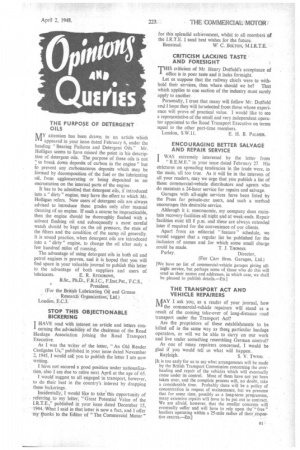THE PURPOSE OF DETERGENT OILS
Page 35

If you've noticed an error in this article please click here to report it so we can fix it.
AffY attention has been drawn to an article which LVI appeared in your issue dated February 6, under the heading "Bearing Failures and Detergent Oils." Mr. HoIligan seems to have missed the point in his description of detergent oils. The purpose of these oils is not "to break down deposits of carbon in the engine" but to prevent any carbonaceous deposits which may be formed by decomposition of the fuel or the lubricating oil, from agglomerating or being deposited as an encrustation on the internal parts of the engine.
It has to be admitted that detergent oils, if introduced into a " dirty " engine, may have the effect to which Mr. Holligan refers. New users of detergent oils are always advised to introduce these grades only after manual cleaning of an engine. If such a course be impracticable, then the engine should be thoroughly flushed with a solvent flushing oil and subsequently a most careful watch should be kept on the oil pressure, the state of the filters and the condition of the sump oil generally. It is sound practice, when detergent oils are introduced into a " dirty " engine, to change the oil after only a few hundred miles of running.
The advantage of using detergent oils in both oil and petrol engines is proven, and it is hoped that you will find space in your valuable journal to publish this letter to the advantage of both suppliers and users of lubricants. E. R. REDGROVE, B.Sc., Ph.D., F.R.I.C., F.Inst.Pet., F.C.S., President.
(For the British Lubricating Oil and Grease Research Organization, Ltd.) London, E.C.3.












































































